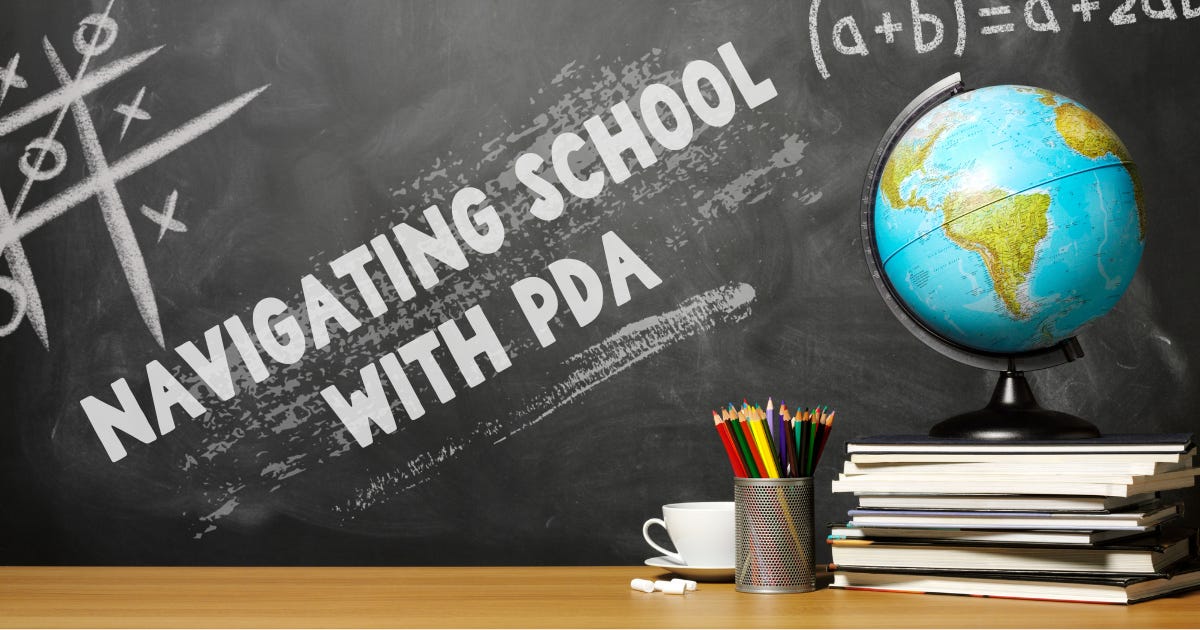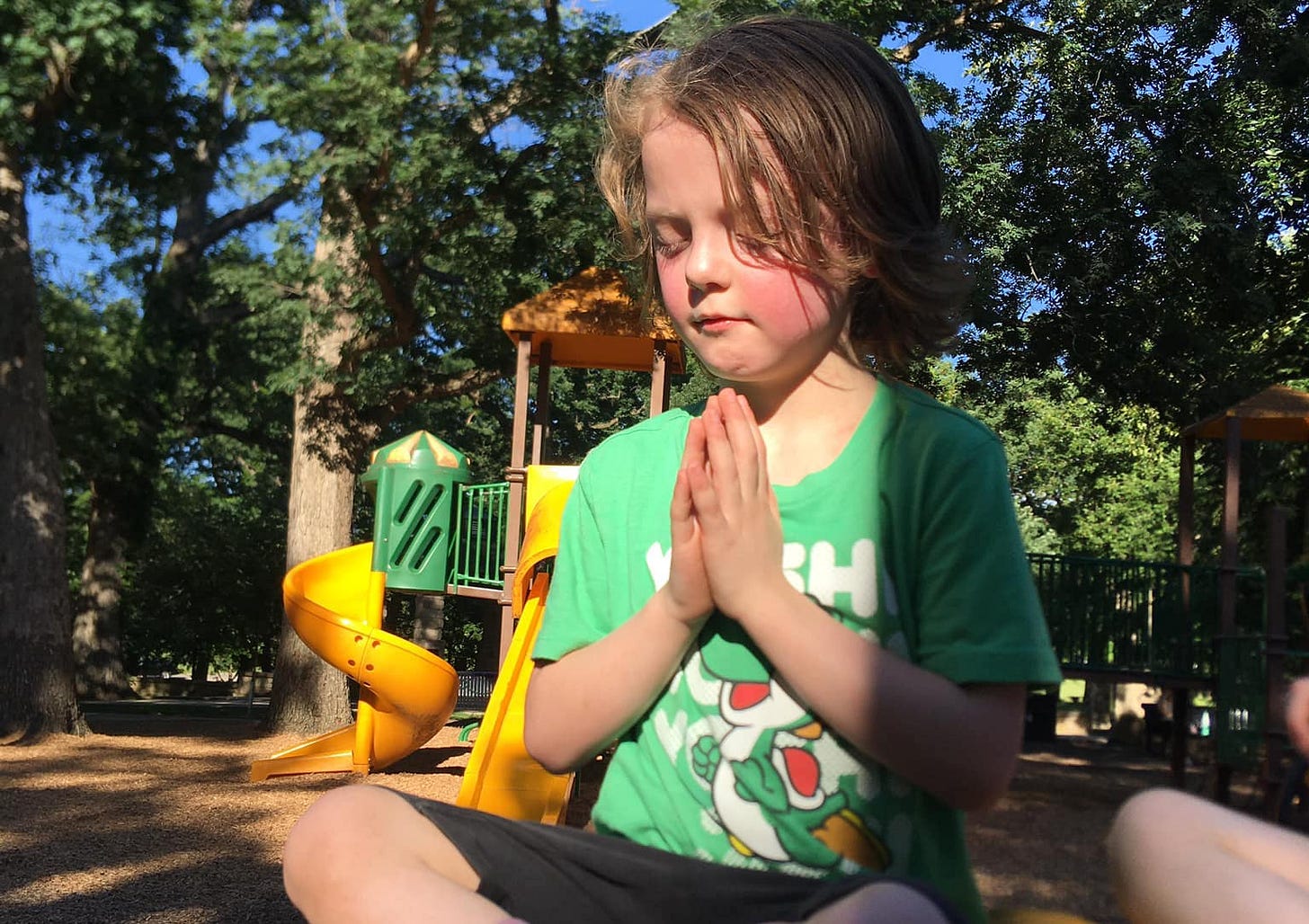Navigating School with PDA
Pathological demand avoidance/persistent drive for autonomy can make it difficult for PDA kids to thrive in a conventional classroom. What are your options?
Navigating School with PDA
High school drop-outs are usually tragic figures in cautionary tales, but at 36, I have no regrets about not finishing school the “normal” way.
As a child, I loved school—for a while. I started preschool at a private Montessori school where I could choose my work. Even though Montessori has a very structured curriculum, the teachers spoke to us like adults, presumed competence, and took a hands-off approach that allowed students to work at their own pace.
Even after transitioning to public school in the second grade, I was labeled a “gifted” student and given a lot of autonomy. When I was seven, my drive for independence and equality was considered charming and precocious—but middle school changed everything. By 12, the same behaviors that once charmed my teachers were considered argumentative and disobedient.
As the social demands at school increased, my mental health rapidly declined until I was in total burnout and actively suicidal. At 13, I regularly pretended to be my mother to call myself in sick. At the start of my sophomore year, I refused to return to school altogether.
Recognizing that my mental health was in crisis, my mom agreed to pull me out of conventional school. I officially dropped out of public school at 15, spent the next few years deschooling, and got my GED in my 20s.
That choice literally saved my life, and my story is far from unique. PDA needs are a lot different than neurotypical needs, and many traditional schools are ill-equipped to meet the needs of PDA students.
What is school refusal?
School refusal is a chronic inability to attend or stay in school. School refusal is common in PDA youth—70% of PDA children struggle to attend school regularly.
Your child’s educational journey may not look anything like what you expected, and that’s okay.
Again, it’s okay if your child’s educational journey doesn’t look like you expected.
Parents face intense social pressure to “maximize” their children’s education, but there’s no one-size-fits-all solution to educating children. The right educational solution is the one that works for your child and your family.
What can you do when your child refuses school?
Avoid making school a power struggle whenever possible.
Reassure your child that you’re on their team and want to collaborate to find a solution that works for everyone.
Keep in contact with the school administration. School refusal is not truancy, and keeping the school updated may help you avoid truancy notices.
Talk to your child’s teacher and the school administration about PDA and suggest adaptations and support methods that may be helpful for your child.
Discuss part-time options with the school administration. Some districts allow students to attend school for half-days or to pick and choose specific classes or activities.
Consider alternative options like virtual schools, democratic/self-directed schools, or homeschooling.
Exercise caution when considering autism-specific schools or mental health schools. Avoid schools based on rewards and punishments or other forms of behaviorism and those advocating for ABA therapy. Take the time to do your research!
Homeschooling
Homeschooling is often the first alternative schooling option parents consider, and it can be an excellent fit for PDA kids and families. The homeschool community has a vast, international online presence—it can be overwhelming for first-time homeschoolers to navigate! I planned to homeschool before my first child was born, and I can still get overwhelmed by the sheer volume and variety of homeschooling resources, styles, and opinions.
If you’re exploring homeschooling and feeling entirely out of your depth, know that it’s 100% normal for first-time homeschoolers to have a lot of anxiety around homeschooling. Educating your children is a big job, and pretty much everyone exploring homeschooling wonders if they’re up for the task.
If you were conventionally schooled, you might be exhausting yourself trying to recreate a conventional school experience at home. Your home school does not need to resemble a traditional classroom experience. Homeschool days are typically much shorter than conventional school days, and many homeschoolers don’t use any traditional schooling methods: no worksheets, lectures, memorization, or grading.
Homeschool styles that I would consider more PDA-friendly include:
Gameschooling
Research shows that humans don't learn well when stressed and anxious. PDA children are constantly in survival mode, easily tipped into a fight, flight, freeze, or fawn response. Play engages, relaxes, and challenges us—ideal conditions for learning. Gameschooling is a homeschooling method focused on the inherent educational benefits of play and games.
While math and literacy-based games are great, kids learn through all play, not just games with an educational stamp on the box. PDA children often have rich fantasy lives and gravitate towards story-based play. Dungeons and Dragons and other narrative role-playing games aren't typically considered "educational," but they're fantastic for teaching language arts, public speaking, performance, teamwork, math, and so much more.
Follow your child’s interests—what kind of play do they already enjoy? Maybe your kid struggles to complete a five-minute worksheet but can spend hours building an intricate Minecraft world. Neurodivergent kids often gravitate toward gaming naturally, and gameschooling allows you to utilize your child's natural interest to cultivate enthusiasm for learning.
Gameschooling ideas:
Play narrative games—pretend games, tabletop role-playing/storytelling games, or narrative video games to teach the elements of a story.
Make gaming videos for YouTube to practice scriptwriting, public speaking, film editing, and marketing.
Collect Language-focused games like Scrabble, Mad Libs, Rory's Story Cubes, and magnetic poetry and science-focused games like science-based games like Anatomy Fluxx, Cytosis, or Lazer Maze.
Play board games that involve dice, counting moves, or keeping score.
Gameschooling resources:
ChessKid—my oldest loves using this website/program to learn and play chess
Project-based Homeschooling (PBH)
Project-based homeschools are typically modeled on the Reggio Emilia Approach and are autonomous and collaborative by nature. Project-based homeschools can utilize the natural neurodivergent tendency to hyperfocus on “narrow but deep” interests. Some project-based homeschools do a series of unit studies, and some focus on the same topic all year!
PBH students direct and manage their learning, making this an excellent fit for families exploring unschooling. They decide what projects to complete and what information and materials they need. This student-directed model works well for many learners resistant to adult instruction or things they view as “educational.”
Adults in a project-based homeschool act as collaborators, facilitators, and research partners. Your primary role is to provide your children with the materials, space, and time to pursue their passions.
PBH resources:
Lori Pickert’s book Project-based Homeschooling: Mentoring Self-Directed Learners
PBH ideas:
Help your child create their own YouTube channel. They can research what it takes to make a successful channel, decide on a topic or niche, write scripts, and practice performing in front of the camera.
Start a garden. Research different types of formal and casual gardens and collaborate with your child to decide on gardening methods, layout, and design. Observe which areas of your yard get full and partial sun, test your soil acidity, and determine your hardiness zone.
Alternative Schools
Democratic Schools
Democratic schools are often (but not always) child-led, project-based schools that resemble an unschooling or homeschooling collective more than a conventional school. The defining characteristic of schools is that they’re run—you guessed it—democratically, with staff members and students having equal voting power.
The Sudbury Valley School in Framingham, Massachusetts, is probably the most famous school using this model. Newer schools following the Sudbury model exist in the U.K., Germany, and the United States.
Montessori Schools
I went to a Montessori school for preschool, kindergarten, and first grade, and I loved it. Montessori is more structured than democratic/Sudbury schools but still very child-led, which makes them a good fit for some PDAers. Montessori schools offer student-led, self-paced learning in multi-age classrooms.
Note: Montessori is not a regulated term, so schools that don’t follow the Montessori philosophy can still call themselves a Montessori school. Do your research before deciding on a specific school for your child!
Other alternative schools to consider include:
Waldorf Schools
Virtual Schools
Reggio Emilia Schools
Remember: there is no one-size-fits-all solution for school refusal. Every PDAer is different! While many of us thrive while homeschooling or unschooling, many PDAers are very social and want the typical experience of attending in-person school with their friends. There may be a trial-and-error process before you find the right fit for your child and your family.
Have you found a school or homeschool style that your child loves? Are you still struggling to find the right fit? Leave a comment and let us know what’s working (and not working) in your family!
Subscriber Chat
There’s a brand new addition to PDA Perspectives: the PDA Perspectives subscriber chat!
This is a conversation space in the Substack app that I set up exclusively for my subscribers—kind of like a group chat or live hangout. I’ll post short prompts, thoughts, and updates that come my way, and you can jump into the discussion.
To join our chat, you’ll need to download the Substack app, now available for both iOS and Android. Chats are sent via the app, not email, so turn on push notifications so you don’t miss a conversation as it happens.
How to get started
Download the app by clicking this link or the button below. Substack Chat is now available on both iOS and Android.
Open the app and tap the Chat icon. It looks like two bubbles in the bottom bar, and you’ll see a row for my chat inside.
That’s it! Jump into my thread to say hi, and if you have any issues, check out Substack’s FAQ.
About NeuroNesting:
I’m an AuDHD/PDA adult, freelance writer, wife to an autistic partner, and homeschooling mom of three neurodivergent kids. I created NeuroNesting to encourage a dialogue between PDA adults and parents of PDA children—or anyone looking for a deeper understanding of PDA. Have questions, comments, or topics you’d like to see addressed? Drop me a line at ariel@neuronesting.com
I’m committed to keeping NeuroNesting free and accessible for all. If you want to support this effort financially (each post takes hours to write!) you can:
Pledge your support with a paid Substack subscription—click here to support NeuroNesting for less than $2 a month!
Purchase books at the NeuroNesting Bookshop






You do a great job of specifying the challenges of navigating school with PDA and offer great alternatives. Thanks for sharing these practical tips!
Love this !